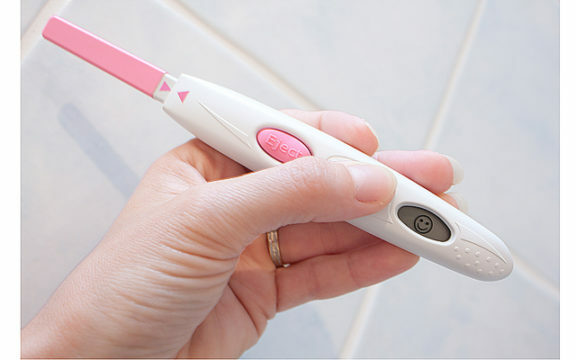If a woman is diagnosed with type 1 diabetes, this does not mean that pregnancy can be forgotten. Modern medicine allows young women to take out a healthy baby even with such a serious illness. Future pregnancy should be carefully planned, prepare for such an important event should be in advance. The future mother should observe a stable compensation, so that the fetus develops within the limits of the norm, and the woman's health is not threatened.

Peculiarities of pregnancy of women with type 1 diabetes
Six months before conception, a woman should take the following measures:
- It is necessary to undergo a full diagnostic of the body and pass the necessary tests;
- Visit the nephrologist, check the functionality of the kidneys. At the time of bearing the child, this body is under double load, so it is so important to monitor their condition;
- Check eye fundus with ophthalmologist, if necessary, treat;
- Observe the pressure, at large jumps it is necessary to observe the doctor.
Throughout pregnancy, the body's need for insulin is constantly changing. Every trimester these indicators change. In the first trimester, the need is reduced. The onset of pregnancy is often accompanied by toxicosis in the form of vomiting. For a healthy woman, this is not dangerous, unlike a woman with a diagnosis of insulin-dependent diabetes.
If the injection with insulin has already been done, and the urge to vomit has occurred later, carbohydrates will not enter the body in full. This threatens to worsen the general condition of the future mother. In the second trimester, the need for insulin sharply increases. At the final stage of bearing the child, the need again falls. In order not to miss the decrease in blood sugar, a woman should be under the constant supervision of doctors.
Several decades ago, type 1 diabetes and pregnancy were incompatible concepts. However, medicine does not stand still, and even with such a diagnosis one can count on the birth of a healthy baby. With properly selected insulin therapy, the death rate at birth is almost zero, but the threat to the baby's life remains high - about 6%.
Possible risks in pregnancy
Girls who are pregnant and who are suffering from insulin-dependent diabetes are at risk for the following reasons:
- High probability of abortion;
- A large percentage of congenital malformations of the child;
- During pregnancy, complications may occur in type 1 diabetes;
- The appearance of diseases of the genitourinary system;
- Labor can begin several weeks ahead of schedule;
- Caesarean section is the most favorable kind of delivery.
Women in the situation should be ready to spend most of the pregnancy in a hospital under the supervision of specialists. This is a necessary requirement for a successful pregnancy. Hospitalization consists of three parts:
- The first hospitalization is carried out in the first weeks of the term. A woman undergoes a thorough examination of all organs, her tests are taken. According to the results of the diagnosis, doctors decide whether it is possible to have a healthy child and whether there is a risk to the mother's health. Further necessary preventive actions are carried out for the further course of pregnancy.
- The second stage of hospitalization is carried out after 20 weeks. Sharp surges in the body's need for insulin on these terms should be under the supervision of doctors.
- The final stage. Pregnancy with type 1 diabetes requires the hospitalization of a woman in the last weeks of pregnancy, doctors observe the development of the fetus, in case of complications, a decision is made about early childbirth.

No matter how the science has developed, there is a category of women with insulin-dependent diabetes, to whom pregnancy is contraindicated:
- With complete damage to the vessels of various organs( micrangiopathy);
- In the form of the disease, when treatment with insulin does not have the proper effect;
- If both spouses have diabetes;
- If there is a rhesus - conflict;
- With tuberculosis and diabetes at the same time;
- If previous pregnancies end with the birth of a dead infant or child with congenital abnormalities.
Birth of
Birth, as well as pregnancy with type 1 diabetes, have their own distinctive features. If there are no serious complications, delivery takes place naturally.
For the physician to make decisions about natural delivery, the following factors must be met:
- The nature of the course of diabetes during the entire pregnancy;
- Are there any complications?
- Fetal condition. Its weight should not exceed 4 kg.
Hormones may be used to stimulate labor. During the birth process, the condition of the expectant mother is under strict control - the blood glucose and the child's heart rate are constantly measured with the help of CTG.If there is a sharp increase in sugar in the blood, an injection of insulin becomes pregnant. With poor opening of the cervix and weak labor, a caesarean section is performed. This will avoid complications, both for mom and for the baby.
Most often, large children are born in insulin-dependent women. This is due to the fact that babies have more fatty tissue than other children. Also, the child can have cyanotic skin, puffiness. In the first days of life, the infant adapts poorly to the environment, possibly the appearance of a jaundice and a sharp decrease in weight.
The probability of malformations in a child is doubled, compared with a successful pregnancy. Heart disease, improper formation of the gastrointestinal tract, kidney damage are the main diseases that occur in children of insulin-dependent women.

Therefore, a woman planning a child should prepare for pregnancy six months before conception. Constant monitoring of their health, reduces the likelihood of a child with congenital diseases.
In the postpartum period, the need for insulin changes. To prevent hypoglycemia, insulin doses decrease. The optimal dosage can be selected by constantly measuring the blood sugar level.
If some time ago a woman suffering from diabetes mellitus could not even think about breastfeeding, now the situation has radically changed. If during the whole pregnancy the diabetes was compensated, and the births proceeded without complications, breast-feeding is quite possible.
With hypoglycemia, there may be a decrease in blood flow to the mammary glands and as a consequence of this decrease in the amount of milk produced. To prevent such a situation, a woman must constantly monitor her health. According to its composition, the milk of an insulin-dependent woman differs from the milk of a healthy lactating mother only with an elevated glucose content. But even with such a factor, breastfeeding is more beneficial for the child.
In our time, type 1 diabetes and pregnancy are quite comparable concepts. Insulin-dependent diabetes is one of the serious chronic diseases that affects all areas of human life. But medicine does not stand still, and now type 1 diabetes is not an obstacle to pregnancy. The main recommendation of doctors for women suffering from this ailment is to plan the birth of a child in advance, undergo a complete examination of the body and carefully monitor their health all the time. With all the doctor's instructions, you can give birth to a healthy baby.




